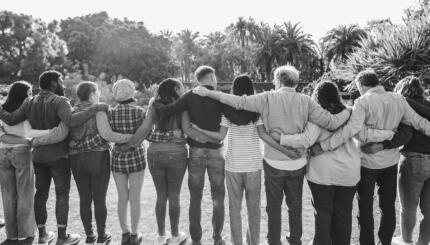We sometimes think of the Shema as solely the prayer’s opening line: “Hear O Israel, the Lord is our God, the Lord is One.” My childhood rabbi proclaimed this as the “watchword of our faith.”
But the Shema continues with a series of verses taken from the book of Deuteronomy. The opening word of this section is Veahavta, “You shall love.” The verse continues: “You shall love the Lord your God with all your heart and with all your soul and with all your might.”
Understanding the deeper meaning of each of these words — heart, soul, might — enhances the power of this central Jewish prayer.
With All Your Heart
What does it mean to love God with all your heart? We find a clue in an unusual feature of the Hebrew word for heart — lev. Typically, it is spelled with two Hebrew letters, lamed and vet. But in this instance there is an additional vet. The medieval philosopher Maimonides suggests that this teaches us that we are to love God both when we feel fortunate and when we are in despair.
With your help, My Jewish Learning can provide endless opportunities for learning, connection and discovery.
It’s so much easier to love God when things are good. If we are healthy and prospering, we can praise God without thinking too much about it. But when our lives take difficult and unexpected twists, when hope seems to fade and our frustrations mount, we also need to find a way to express that love.
This particular interpretation took on great meaning for many Jews after the Holocaust. How could we find the strength to love God when millions of fellow Jews were murdered? The answer many gave was another question. Seeing how much horror human beings can inflict on one another, how can we not turn to God? It is in the most difficult times that the love of God can help us realize we are more than biological animals. We are human beings created in God’s image.
Loving through loss and despair is harder than it sounds. Pain can frequently lead to anger. In marriages that endure a difficult experience, pain can weaken and even destroy a relationship. Anger and frustration take up the emotional space love once held. But the opposite can also happen. Partners can learn about and love one another even more, deepening the relationship and emerging even stronger. Either scenario is possible. The difference can be love.
With All Our Soul
The talmudic sage Rabbi Akiva, who was born in the first century of the Common Era, gave one of the most powerful interpretations of this phrase. According to the Talmud, the Romans arrested him immediately after reciting the Shema in public. As he was tortured, he continued to recite the Shema.
The executioner urged him to stop, as did his fellow rabbis. “Do you need to suffer so much for the sake of Torah?” they asked him. Akiva answered with the following teaching.
“All my life,” he said, “I have wondered the meaning of the verse ‘You shall love the Lord your God with all your soul.’ I have loved God with all my heart. I have loved God with all my possessions [my might]. But I have never known what it meant to love God with all my soul. Now that I have come to this point—where God is about to take my soul—I know it what it means.”
Akiva then recited the Shema again and, according to the Talmud, his soul departed him as he recited the final word: Echad.
This does not mean that we have to be martyrs in order to love God with all our souls. But we love God in this way when we are ready to die for something larger than ourselves.
If this seems more consistent with an age of religious fundamentalism, consider some of the heroes of our time. Think of Nelson Mandela, who suffered 27 years in prison to achieve freedom in his homeland. Or the persecuted religious minorities — Christians in the Middle East, Buddhists in Tibet, Jews throughout history — who have risked death to practice their faith.
Every year on the holiday of Yom Kippur, we recite the Kol Nidre prayer, which asks God to forgive us for the promises we make but cannot keep. The prayer was originally said by Jews who were forced to convert to Catholicism during the Spanish Inquisition but continued to practice Judaism in secret. On the holiest day of the Jewish year, we recall that willingness to die.
Though it may sound gruesome, imagining our own death can help us learn how to live. We see that our years are limited and how valuable every moment is. Life becomes more sacred when we recognize its limits. To love God with all our soul is to love the limited time on earth God gave us.
With All Our Strength
This last phrase in the commandment to love God seems out of place. Three part progressions in the Torah typically end with the hardest one and the rabbis interpret “all your strength” to mean financial resources. Is giving money really harder than being willing to die for the sake of God? Put another way, do some people consider money more valuable than life itself?
If this sounds impossible, consider the lengths some people go to save a dollar. Consider someone who refuses to see a doctor when they’re sick because of the cost. Or who would ensure a painful walk in the cold to avoid a $10 cab ride. Such stories are sometimes funny and reflect a frugal mindset. But other times they reflect the extraordinary and irrational risks people will take to save a small amount of money.
So what does it mean to love God with all our financial means? Taken to an extreme, this teaching can be quite dangerous. Think about televangelists who prey on down-and-out people, inducing them to donate their last dollars as a sign of faith.
The rabbis addressed this issue in a creative way. They suggested loving God with all our resources does not mean giving all of our resources over to God. The obligation to give charity is addressed elsewhere in Jewish law. Loving God with all our might implies an attitude toward life rather than a specific monetary obligation.
One rabbi illustrated this idea with an intriguing example. He taught that a person’s love of God should be so great that it flows into their very possessions so that they too glow with a love of God. He cites the example of a donkey that belonged to one of the great rabbis of the Talmud. This rabbi’s love of God was so great that his donkey refused to eat non-kosher food.
This bit of rabbinic hyperbole teaches a deeper lesson: Our love of God can teach and inspire others. The way we live influences the way others live. If we show a deep love of God, we spread it into the lives of others.
Rabbi Evan Moffic is the spiritual leader of Congregation Solel in Highland Park, Illinois. He is the author of the “The Happiness Prayer: Ancient Jewish Wisdom for the Best Way to Live Today.”



